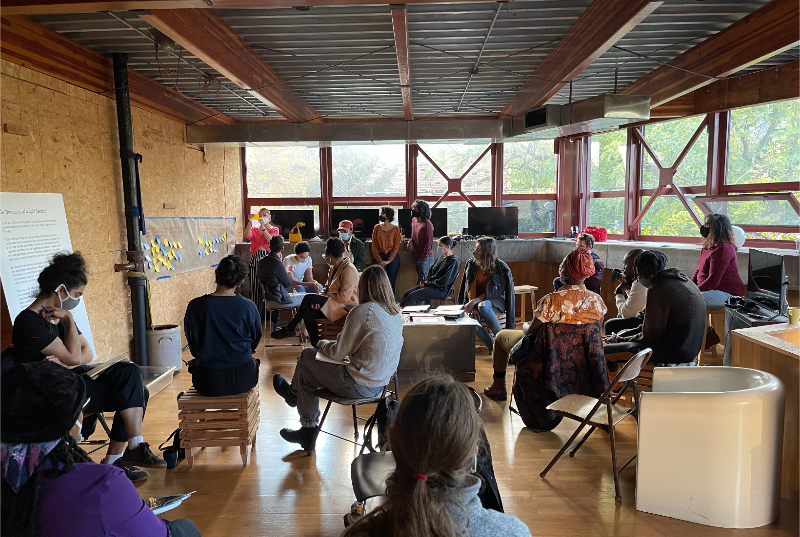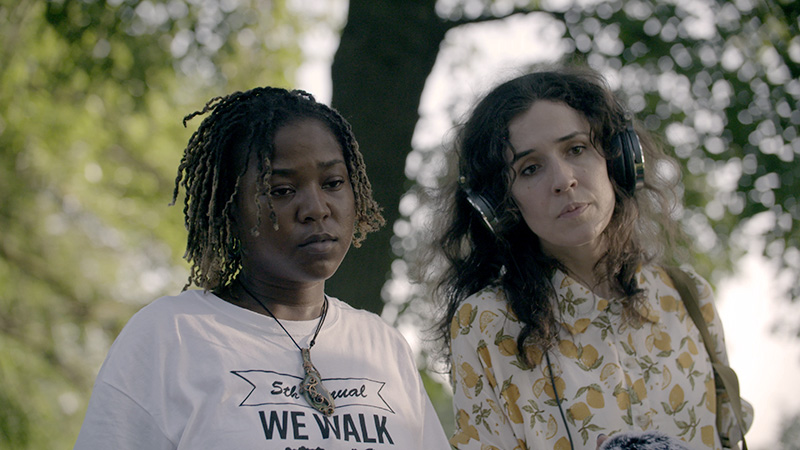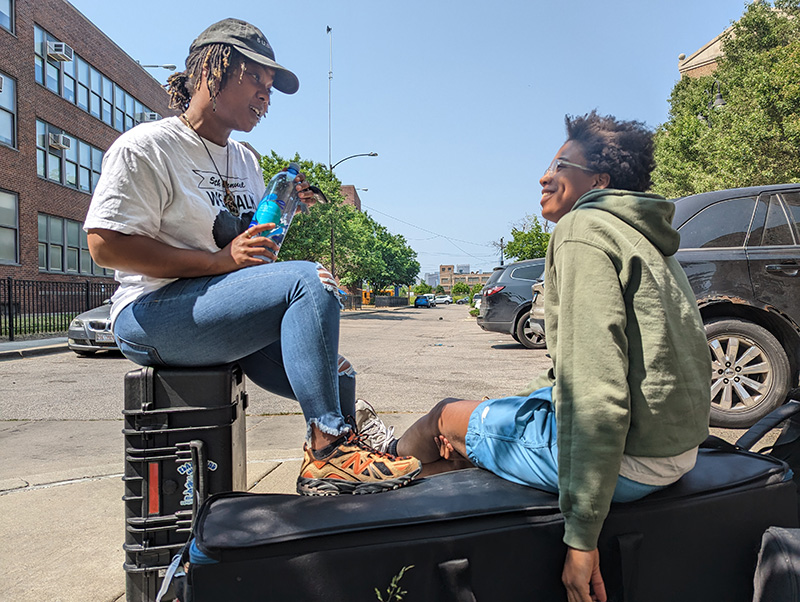In 2019, Beneath the Surface director Trina Reynolds-Tyler began training as a data scientist with the Human Rights Data Analysis Group (HRDAG), where she analyzed open missing person cases in Chicago. Over the next three years, Reynolds-Tyler led a team of 200 volunteers at the Invisible Institute and HRDAG to review thousands of official police complaint narratives and train an algorithm to parse through thousands more records for buried descriptions of gender-based violence, including instances where police neglected to provide help.
One pattern that emerged was neglect by police when Black families reported a loved one missing. For four years, Beneath the Surface team members have attended the annual We Walk for Her March for Missing and Murdered Black Women, meeting activists and families most affected by this neglected crisis in Chicago, and providing data analysis on racial disparities among missing person cases to the press and organizers. (Watch the PBS Independent Lens short documentary on this work here).
In 2021, Reynolds-Tyler partnered with Sarah Conway, senior reporter at City Bureau, to investigate how police respond to missing person cases. Conway and Reynolds-Tyler’s work together over the past two years has led them to interview more than 40 sources, review Cook County medical examiner’s records, drive to rural Illinois to talk with family of missing person Shantieya Smith, speak with on- and off-record police and government sources, attend local school council meetings, host gatherings for families of missing loved ones and attend the We Walk For Her March for three years.



The Chicago Missing Persons project is the latest in a long history of collaboration between City Bureau and the Invisible Institute, who both share a foundational ethos of cross-disciplinary, collaborative reporting that reflects community priorities. Both non-profit journalism organizations shared a home in their early formative years at the Experimental Station in the Woodlawn neighborhood of Chicago. From 2016 to 2018, the organizations collaborated to create the Chicago Tracker Project, which used Excel spreadsheets and the Genius annotation tool to provide contextual reporting on Use of Force guidelines, the Police Accountability Task Force’s recommendations and progress and the Fraternal Order of Police’s contract. Over the past few years, City Bureau and the Invisible Institute have co-produced four Public Newsrooms, shared staff, and supported each other in a growing and thriving independent, local news ecosystem in Chicago.
Together, City Bureau and the Invisible Institute reported and edited the stories that make up this project, and are publishing excerpts in the Chicago Reader and The TRiiBe.
For press and other organizational requests, contact media@invisibleinstitute.com and media@citybureau.org.
For questions, tips, comments, and reflections for the reporters, contact us here.
City Bureau is a journalism lab reimagining local media. We do this by equipping people with skills and resources, engaging in critical public conversations and producing information that directly addresses people’s needs. Drawing from our work in Chicago, we aim to equip every community with the tools it needs to eliminate information inequity and further liberation, justice and self-determination.
City Bureau’s programs include the Civic Reporting Fellowship, the Public Newsroom, Chicago Documenters, and the Documenters Network. Together, our programs model a more equitable, accessible, and responsive approach to local media.
While we believe that our work can benefit anyone who reads our coverage or participates in our programs, we have a sustained programmatic and editorial focus on communities of color on the South and West sides of Chicago where disinvestment is especially concentrated. Our reporting has taken up public housing, temp worker protections, maternal health, the inner workings of City Council and resources to understand Chicago’s budget, among other topics that reflect community priorities.
The Invisible Institute is a nonprofit journalism production company on the South Side of Chicago. We work to enhance the capacity of citizens to hold public institutions accountable. As we address the racial inequities that deform our society, we also work to alter the asymmetrical power dynamic within journalism by creating the conditions for people to drive their own narratives, putting our craft at the service of their experience. Our work is organized around a central principle: we have co-responsibility with the government for maintaining respect for human rights and, when abuses occur, for demanding redress.
We use a variety of tools including investigative reporting, multimedia storytelling, human rights documentation, the curation of public information, and the orchestration of difficult public conversations. The Invisible Institute produces work in the medium that best carries the narrative; all of our narrative work starts with long term investigations prioritizing stories that otherwise would not be told. To date, our work has appeared as written publications, podcasts, art exhibits, and public dialogues, including the four-part series “Code of Silence” published in The Intercept and local print via South Side Weekly; the part-investigation and part-memoir podcasts Somebody and You Didn’t See Nothin; a collaboration with Forensic Architecture investigating the killing of Harith Augustus (presented of Chicago Architecture Biennial), a Pulitzer-Prize winning investigation Mauled, and other investigative forms springing from our seminal data projects: CPDP.co and Beneath the Surface.
Your support keeps us on the ground reporting the stories and recovering data that surface abuses of power. We measure our work by the impact it has on policy and practice, which occurs through sustained public engagement. We are deeply grateful to the generous donors who make the Invisible Institute’s work possible.
Consider supporting our work by making a monetary contribution today.
Stay informed and up to date on our forthcoming investigations and other updates in our work by subscribing to View from the Ground: a monthly roundup of developments and coverages on issues central to our work.
We are deeply grateful to our many collaborators who made this project possible.
Bettina Chang
Andrew Fan
Alison Flowers
Jamie Kalven
Audrey Petty
Tarak Shah // tarak@hrdag.org
Trina Reynolds-Tyler
Bailey Passmore // bailey@hrdag.org
Larry Barrett // larrybarrett11@icloud.com
MiKayla Green // mikaylagreen811@gmail.com
Sajel Galhotra // galhotra@stanford.edu
Sierra Wells // sfwells@stanford.edu
Aïcha Camara
Leanna Seymour
Director, Producer, Cinematographer: cai thomas
Video Editor: Brooke Elyse
Sound Recordist: Erisa Apantaku
Project Manager: Yasmin Zacaria Mikhaiel
Ariel Cheung
Carol Saller
Chicago Reader
The TRiiBE
And thank you to the anonymous sources who shared critical information and context with us.